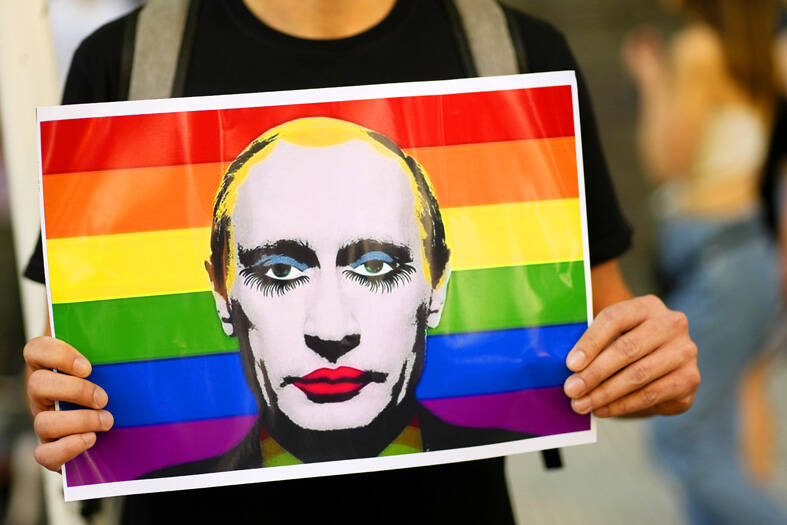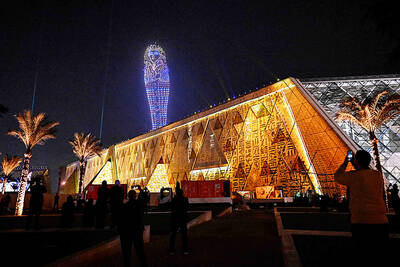Russian President Vladimir Putin has decided to run in the presidential election in March next year, a move would keep him in power until least 2030, as the Kremlin chief feels he must steer Russia through the most perilous period in decades, six sources told Reuters.
Putin, who was handed the presidency by Boris Yeltsin on the last day of 1999, has already served as president for longer than any other Russian ruler since Joseph Stalin, beating even Leonid Brezhnev’s 18-year tenure.
Putin turned 71 on Oct. 7.

Photo: AP
The sources, who spoke to Reuters on condition of anonymity due to the sensitivity of Kremlin politics, said that news of Putin’s decision had trickled down and that advisers were now preparing for the campaign and a Putin election.
For Putin, who opinion polls show enjoys approval ratings of 80 percent inside Russia, the election is a formality if he runs: With the support of the state, the state media and almost no mainstream public dissent, he is certain to win.
“The decision has been made — he will run,” said one of the sources who has knowledge of planning.
A choreographed hint is due to come within a few weeks, another source said, confirming a Kommersant newspaper report last month.
Another source, also acquainted with the Kremlin’s thinking, confirmed that a decision had been made and that Putin’s advisers were preparing for Putin’s participation. Three other sources said the decision had been made: Putin will run.
“The world we look out upon is very dangerous,” one of the sources said.
A foreign diplomatic source, who also requested anonymity, said Putin made the decision recently and that the announcement would come soon.
While many foreign diplomats, spies and officials say they expect Putin to stay in power for life, there has until now been no specific confirmation of his plans to run in the March presidential election.
Kremlin spokesman Dmitry Peskov declined to comment.
Peskov said in September that if Putin decided to run, then no one would be able to compete with him.
The Kremlin has dismissed reports that Putin was unwell as disinformation spread by the West.

‘CHILD PORNOGRAPHY’: The doll on Shein’s Web site measure about 80cm in height, and it was holding a teddy bear in a photo published by a daily newspaper France’s anti-fraud unit on Saturday said it had reported Asian e-commerce giant Shein (希音) for selling what it described as “sex dolls with a childlike appearance.” The French Directorate General for Competition, Consumer Affairs and Fraud Control (DGCCRF) said in a statement that the “description and categorization” of the items on Shein’s Web site “make it difficult to doubt the child pornography nature of the content.” Shortly after the statement, Shein announced that the dolls in question had been withdrawn from its platform and that it had launched an internal inquiry. On its Web site, Le Parisien daily published a

China’s Shenzhou-20 crewed spacecraft has delayed its return mission to Earth after the vessel was possibly hit by tiny bits of space debris, the country’s human spaceflight agency said yesterday, an unusual situation that could disrupt the operation of the country’s space station Tiangong. An impact analysis and risk assessment are underway, the China Manned Space Agency (CMSA) said in a statement, without providing a new schedule for the return mission, which was originally set to land in northern China yesterday. The delay highlights the danger to space travel posed by increasing amounts of debris, such as discarded launch vehicles or vessel

RUBBER STAMP? The latest legislative session was the most productive in the number of bills passed, but critics attributed it to a lack of dissenting voices On their last day at work, Hong Kong’s lawmakers — the first batch chosen under Beijing’s mantra of “patriots administering Hong Kong” — posed for group pictures, celebrating a job well done after four years of opposition-free politics. However, despite their smiles, about one-third of the Legislative Council will not seek another term in next month’s election, with the self-described non-establishment figure Tik Chi-yuen (狄志遠) being among those bowing out. “It used to be that [the legislature] had the benefit of free expression... Now it is more uniform. There are multiple voices, but they are not diverse enough,” Tik said, comparing it

Prime ministers, presidents and royalty on Saturday descended on Cairo to attend the spectacle-laden inauguration of a sprawling new museum built near the pyramids to house one of the world’s richest collections of antiquities. The inauguration of the Grand Egyptian Museum, or GEM, marks the end of a two-decade construction effort hampered by the Arab Spring uprisings, the COVID-19 pandemic and wars in neighboring countries. “We’ve all dreamed of this project and whether it would really come true,” Egyptian Prime Minister Mostafa Madbouly told a news conference, calling the museum a “gift from Egypt to the whole world from a